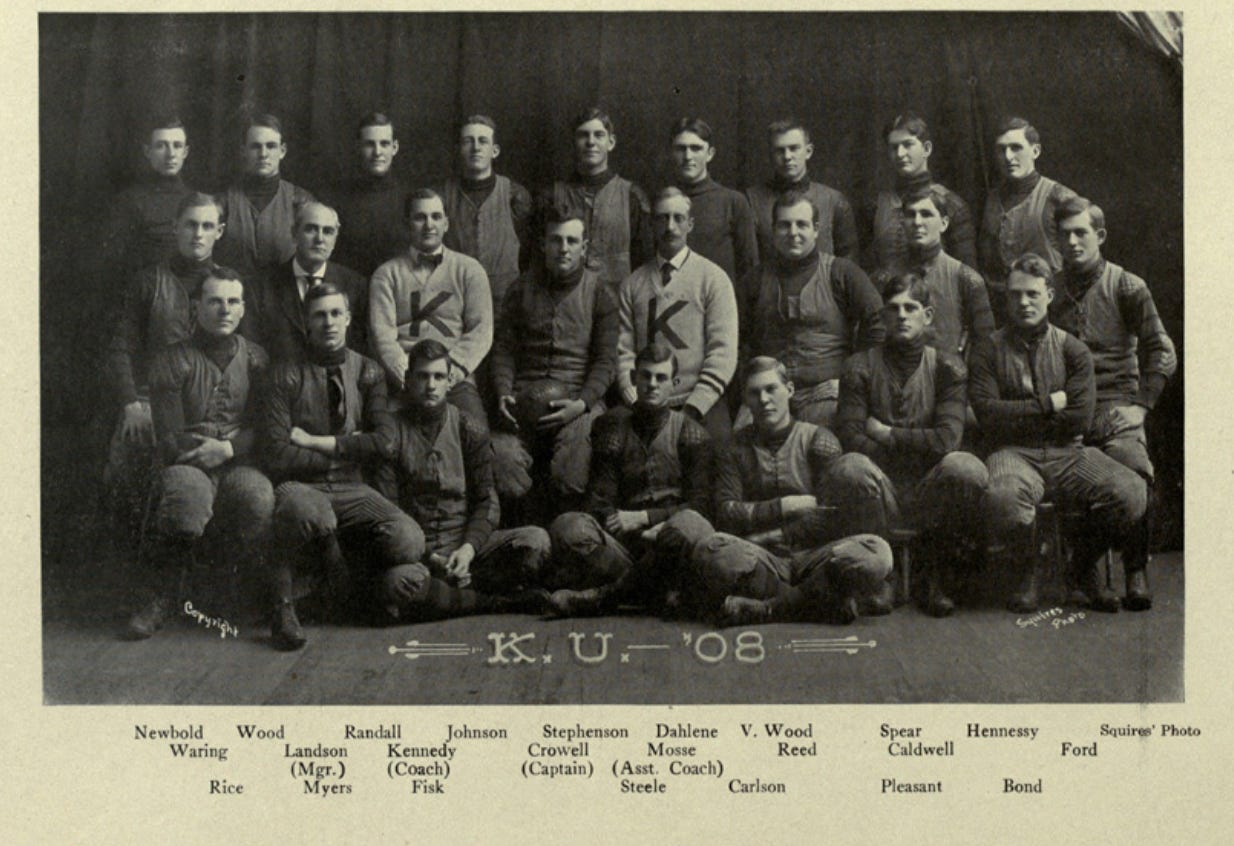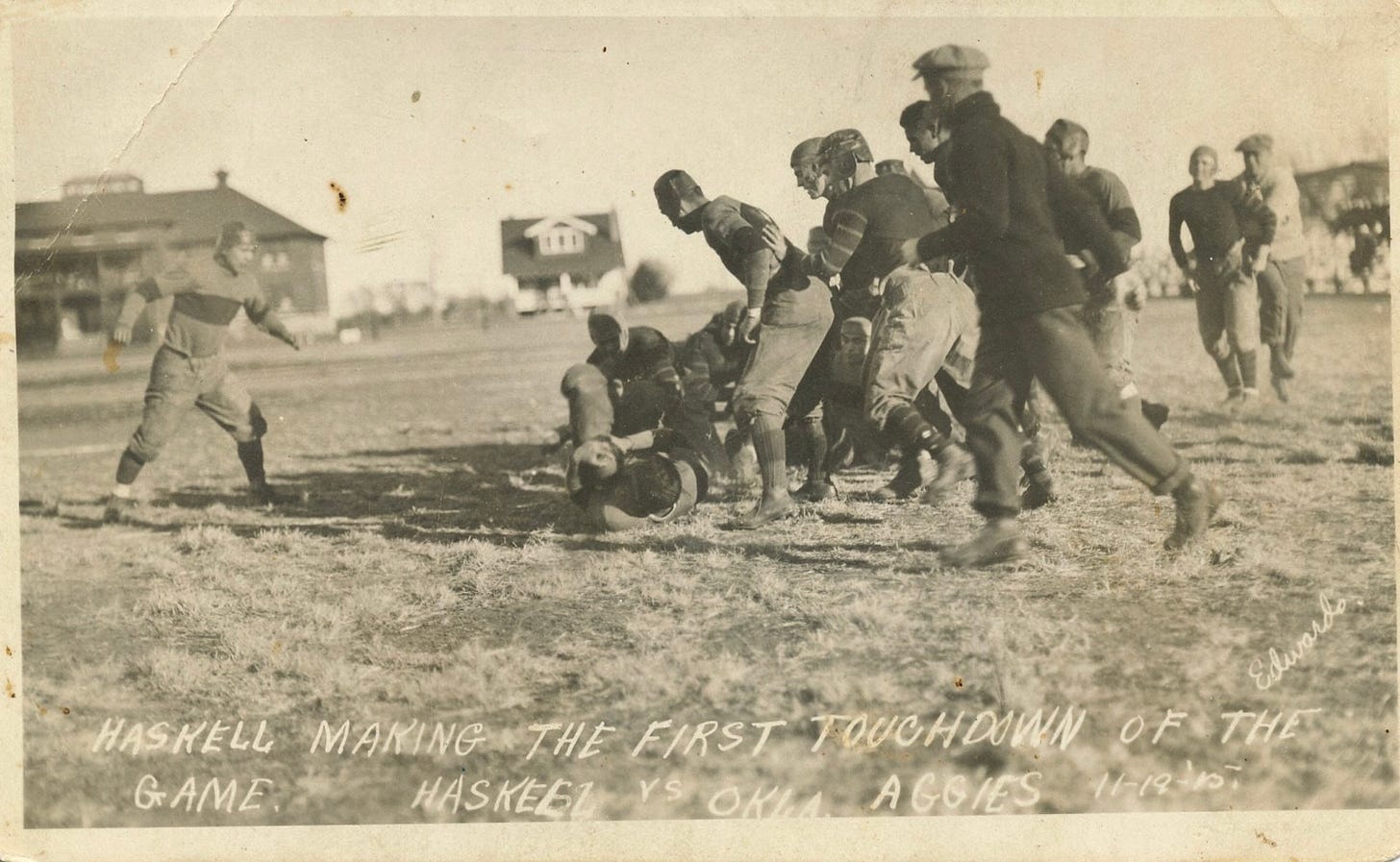Today's Tidbit... When Kansas Fired Their Best Football Coach
If you were a 19-year-old sophomore at the University of Kansas the last time they went undefeated and untied in a football season, you would be 136 years old today, or thereabouts, and hopefully would have graduated by now.
The Jayhawks' last perfect season came in 1908 under the direction of Dr. A. R. "Bert" Kennedy, and his 52 career wins at Kansas remain the most of any coach in history. Not only that, they fired him after the 1910 season due to a new Missouri Valley Conference rule requiring coaches to be full-time faculty members. Kennedy, a practicing dentist, did not qualify. More on that later.
Kennedy grew up near Lawrence and played three years at Kansas (1985-1897) before heading to Penn in 1899 for dental school. He was a second-team player there and did not see action in 1899, but started in 1900. Oddly enough, John Outland followed a similar path, so they played their first college game at Kansas and their last game together at Penn.
He assisted at Penn while completing his studies and then returned to Lawrence and set up a practice. Kennedy coached Washburn, situated 28 miles away in Topeka, in 1903 and took over at Kansas in 1904, compiling a 52-9-4 record, including going 7-0-1 his first year.
His best season came in 1908, when he went 9-0 with conference wins over WashU, Nebraska, Iowa, and Missouri, giving up 20 points all season. (Iowa was in the Big Ten and Missouri Valley Conference then, going 0-4 and 0-1, respectively.)
Kennedy's 1909 team went 8-1, followed by a 6-1-1 record in 1910, and then he was let go.
You might think they fired him for scandalous behavior, but that was not the case. Instead, they let him go under the guise of reforming college football and reducing costs. While the on-the-field rule changes of 1906 focused on the safety of the game on the field, there were parallel concerns that schools overemphasized, football especially, and one sign of that was the common practice of paying big bucks for a coach who was in town during the season only, who left following the last game. Of course, Kennedy did not fit that description as a local dentist and the $1,200 he received for coaching the 1910 did not break anyone's bank.
Still, the reformers of the Big Ten had cut schedules to 5 games per season in 1906 and eliminated freshmen eligibility. The Missouri Valley Conference raised the bar by:
Requiring all games occur on campus, so the annual Kansas-Missouri Thanksgiving Day game in Kansas City was no more
Eliminated all Thanksgiving Day games, even when played on campus
Banning training table
Limiting athletes to two sports per academic year
Making freshmen ineligible
And requiring all coaches to be full-time faculty for the academic year.
Athletic directors who coached multiple sports were not a problem, but the local dentist-coach was banned.
Kennedy's Kansas coaching days overlapped James Naismith and Phog Allen, who set the stage for the Jayhawkers enjoying decade after decade of success on the hardcourt, but not so on the gridiron. Oh, what might have been had Kennedy stayed.
Although Kennedy considered assisting at KU in 1911, he took the Haskell job, which calls Lawrence home as well. Haskell was never the top Indian football-playing school while Carlisle was around, but Kennedy won about two-thirds of his games in five years there.
The old coach took over at Washburn for the 1916 and 1917 seasons, where he had a .500 record, and then left the game, focusing on pulling teeth rather than guards.
It is also worth noting that Kansas has inducted eight former football coaches into the university's athletic hall of fame, including:
John Outland (named as a player)
Phog Allen (coached football in 1920)
George Sauer
Pepper Rodgers
Don Fambrough
Bud Moore
Glen Mason
Mark Mangino
Despite having the most wins and a higher win percentage than the others, A. R. Kennedy is not on Kansas’ hallowed list of coaches. For school with little football tradition, one would think they would remember the coach that got away.
Click here for options on how to support this site beyond a free subscription.







The basketball connection between the University of Kansas and the University of North Carolina is well known. Less well known is the football connection between the two schools. Kennedy's first coach at Kansas was Hector Cowan who came down to Chapel Hill in February 1889 to train the UNC football players. The '89 games were delayed and he was back north, playing indoors, when the team finally took the field.
Carolina has Kansas beat by 10-years with its last unbeaten, untied team.
Man I love to hear stories like this about these very deserving but forgotten people from football s past. Great job on sharing his story and the John Outland connection really took his story over the top! What a shame the Conference rules ended his Jayhawk career, but the Haskell part is intriguing too. Nicely done Mr Brown.